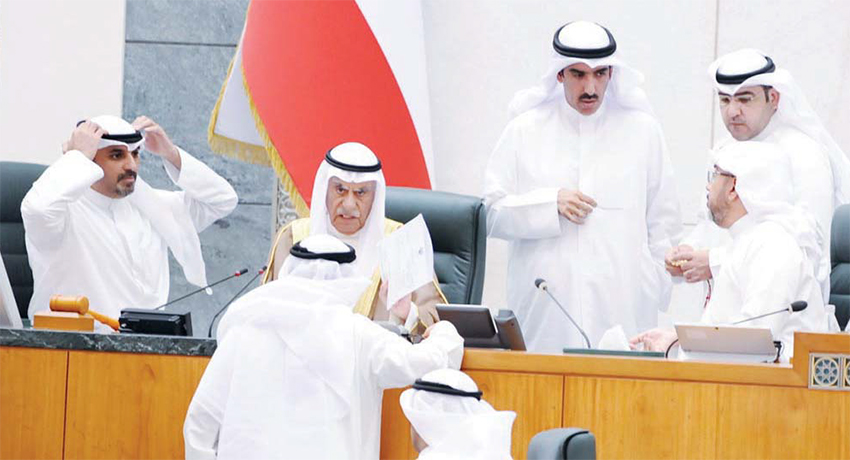13/07/2023
13/07/2023
Ex-speaker Al-Ghanim’s proposal turned down
KUWAIT CITY, July 13: The National Assembly has ratified the Housing and Retirees Health Insurance bills in its special session Thursday. A total of 17 MPs submitted the bill on establishing shareholding companies that will be tasked to implement housing projects. The Assembly unanimously approved the bill in its first and second readings on Thursday. It can be recalled that the nullified 2022 Assembly approved the bill in its first reading.

The bill, which consists of 40 articles, allows local and international private companies to help in addressing the housing issue through the Build-Operate-Transfer (BOT) system for a period of 40 years. The investors will provide the infrastructure, benefit from commercial businesses in each housing project and construct the houses for citizens. It gives the citizens the option to construct their own houses. Citizens will also benefit from the housing projects as the shares of the companies will be offered for public subscription.
Deputy Prime Minister and Minister of Defense Sheikh Ahmad Al Fahd thanked the Assembly for ratifying the bill, pointing out this is the first fruit of the legislative-executive cooperation. Assembly Speaker Ahmad Al-Saadoun also expressed his gratitude to the two authorities for their cooperation in approving the bill in the interest of citizens. All the MPs agreed on the need for the government to immediately issue the executive regulations for this law. MP Adel Al-Damkhi hopes the government will not put obstacles in front of the investors in order to attract the best international companies. He called for laying down regulations to stop citizens from selling the shares allocated for them in order to prevent monopoly.
Following are some of the amendments made to the bill during the session:
■ Before the public subscription announcement, the Public Authority for Housing Welfare (PAHW) must publish a summary of the feasibility study on the shareholding companies including the plans, number of houses and investment projects.
■ The capital of every company will be specified according to the cost and nature of the project assigned to them.
■ The shares will be divided as follows: 25 to 50 percent for public subscription, six to 24 percent for PAHW and other public institutions, and 26 to 49 percent for the companies with the lowest and best offer.
■ The contracts signed by PAHW and the winning companies must stipulate the period for completion of infrastructure and construction works.
■ Houses will be distributed as per PAHW Law number 47/1993.
■ PAHW shall lay down the regulations governing the relationship between the companies and beneficiaries, while a citizen is not allowed to buy more than one house to ensure the law benefits the largest number of citizens. It prohibits beneficiaries from buying houses until they obtain the ownership documents. A beneficiary can terminate the contract with the company and reclaim his money in case of delay in the implementation of the project, violation of the contract and other conditions stipulated in the law.
■ The companies are obliged to carry out regular maintenance works and give 10-year warranty to the beneficiaries.
■ The companies are allowed to benefit from the revenues of commercial businesses in the residential areas for 40 years. This period will be extended by 10 years if the companies provide more services.
■ The concerned public institutions must provide basic services including roads leading to the residential areas and remove all obstacles.
■ The housing projects covered by this law are exempted from the regulations of the Central Agency for Public Tenders (CAPT) and advance monitoring of the State Audit Bureau (SAB).
■ The imported construction materials that will be used for the implementation of housing projects are exempted from customs fees.
■ PAHW must regularly submit reports on the performance of the companies to the Council of Ministers and provide the Assembly with copies of these reports. In addition, the Assembly approved unanimously the bill on amending law number 114/2014 to add more categories to the beneficiaries of the health insurance for retirees in the first and second readings. The additional categories include married Kuwaiti women who are covered by the social allowance, divorcees and widows.
All these women should be above 50 years old. The Assembly rejected the proposal of Al-Ghanim to add the disabled to the beneficiaries. It also approved recommendations to study the possibility of the government signing health insurance contracts with companies which meet Islamic Sharia conditions and establishment of a unit to receive the complaints of the beneficiaries of health insurance for retirees (Afia).
Meanwhile, Housing Affairs Committee Chairman MP Hassan Jawhar explained the bill is aimed at forging partnership between the government, private sector investors and citizens that will get a share of the profits of the companies. He affirmed the State will not bear any cost for the implementation of housing projects, which will greatly contribute to national income.
He pointed out that similar laws succeeded in many countries like Saudi Arabia where the housing sector is the third biggest source of national income, after oil and other investments. He added the law stipulates the provision of infrastructure in three residential cities -- Sabriya, Nawaf Al-Ahmad and South Khairan -- with a total capacity of 100,000 houses. He said many institutions, parties and individuals contributed to the ratification of the law that started in 2020, continued in 2022 and competed in 2023.
He praised the efforts exerted by former Minister of Housing Affairs Ammar Al- Ajmi, PAHW, Kuwait Municipality, Ministry of Finance, Kuwait Credit Bank and Minister of Justice and State Minister of Housing Affairs Faleh Al-Raqaba. Rapporteur of the committee MP Abdulaziz Al-Saqaabi revealed there are 25,000 vacant plots in different residential areas and 15,000 of which are monopolized by 146 individuals. He said the number of housing grant applications is expected to reach 220,000 after 20 years. He then stressed the need to ratify other laws to achieve the sustainable housing goal.


